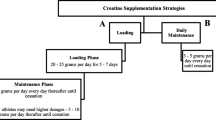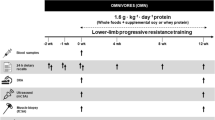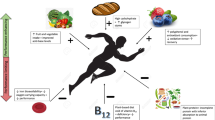Abstract
Purpose of Review
Protein is a macronutrient that is responsible for multiple functions in the human body and is made up of twenty amino acids. Nine amino acids are not synthesized in the human body and require dietary ingestion to prevent deficiency. These essential amino acids are easily obtained through animal-based proteins but can be in limited quantities through plant-based protein sources. With the obesity epidemic rising, great attention has turned to plant-based protein diets and their health and environmental implications. The differences in plant and animal protein sources have been explored for their effects on general health, sarcopenia, and muscle performance. This review discusses the benefits and drawbacks of a plant-based diet, as well as some of the latest literature on muscle protein synthesis between animal- and plant-based dietary intakes of protein.
Recent Findings
High meat consumption is associated with increased saturated fat intake and lower dietary fiber intake. As a result, meat consumption is correlated with obesity, heart disease, metabolic syndrome, and gastrointestinal cancers. However, animal-based diets contain higher amounts of leucine and other essential amino acids which are associated with increased anabolic potential and muscle protein synthesis. Yet, multiple studies show conflicting results on the true benefits of animal-based diets, suggesting total protein intake may be the best predictor for preserving lean muscle mass and increasing muscle performance.
Summary
While many studies support animal protein sources superior to plant-based diets on intracellular anabolic signaling, other studies show conflicting results regarding the true benefit of animal-based protein diets on overall performance and effect on sarcopenia. The health benefits seem to favor plant-based protein sources; however, further research is needed to examine the effects of protein from plant- and animal-based diets on muscle mass and protein synthesis.

Similar content being viewed by others
References
Papers of particular interest, published recently, have been highlighted as: •• Of importance
Chooi YC, Ding C, Magkos F. The epidemiology of obesity. Metabolism. 2019;92:6–10. https://doi.org/10.1016/j.metabol.2018.09.005.
van der Valk ES, van den Akker ELT, Savas M, et al. A comprehensive diagnostic approach to detect underlying causes of obesity in adults. Obes Rev. 2019;20(6):795–804. https://doi.org/10.1111/obr.12836.
Mozaffarian D. Dietary and policy priorities for cardiovascular disease, diabetes, and obesity: a comprehensive review. Circulation. 2016;133(2):187–225. https://doi.org/10.1161/CIRCULATIONAHA.115.018585.
Tuso PJ, Ismail MH, Ha BP, Bartolotto C. Nutritional update for physicians: plant-based diets. Perm J. 2013;17(2):61–6. https://doi.org/10.7812/TPP/12-085.
Lopez MJ, Mohiuddin SS. Biochemistry, essential amino acids. In: StatPearls. StatPearls Publishing. 2021. Accessed 20 Jun 2021. http://www.ncbi.nlm.nih.gov/books/NBK557845/.
Berrazaga I, Micard V, Gueugneau M, Walrand S. The role of the anabolic properties of plant- versus animal-based protein sources in supporting muscle mass maintenance: a critical review. Nutrients. 2019;11(8):1825. https://doi.org/10.3390/nu11081825.
Lonnie M, Hooker E, Brunstrom JM, et al. Protein for life: review of optimal protein intake, sustainable dietary sources and the effect on appetite in ageing adults. Nutrients. 2018;10(3). https://doi.org/10.3390/nu10030360.
Mariotti F, Gardner CD. Dietary protein and amino acids in vegetarian diets-a review. Nutrients. 2019;11(11). https://doi.org/10.3390/nu11112661.
Rutherfurd SM, Fanning AC, Miller BJ, Moughan PJ. Protein digestibility-corrected amino acid scores and digestible indispensable amino acid scores differentially describe protein quality in growing male rats. J Nutr. 2015;145(2):372–9.
Herreman L, Nommensen P, Pennings B, Laus MC. Comprehensive overview of the quality of plant- and animal-sourced proteins based on the digestible indispensable amino acid score. Food Sci Nutr. 2020;8(10):5379–91. https://doi.org/10.1002/fsn3.1809.
Consultation FE. Dietary protein quality evaluation in human nutrition. FAO Food Nutr Pap. 2011;92:1–66.
Ato S, Maruyama Y, Yoshizato H, Ogasawara R. Habitual high-protein diet does not influence muscle protein synthesis in response to acute resistance exercise in rats. Nutrition. 2020;78: 110795. https://doi.org/10.1016/j.nut.2020.110795.
Tipton KD. Gender differences in protein metabolism. Curr Opin Clin Nutr Metab Care. 2001;4(6):493–8.
Deer RR, Volpi E. Protein intake and muscle function in older adults. Curr Opin Clin Nutr Metab Care. 2015;18(3):248–53. https://doi.org/10.1097/MCO.0000000000000162.
Gwin JA, Church DD, Wolfe RR, Ferrando AA, Pasiakos SM. Muscle protein synthesis and whole-body protein turnover responses to ingesting essential amino acids, intact protein, and protein-containing mixed meals with considerations for energy deficit. Nutrients. 2020;12(8):2457.
Gorissen SHM, Witard OC. Characterising the muscle anabolic potential of dairy, meat and plant-based protein sources in older adults. Proc Nutr Soc. 2018;77(1):20–31. https://doi.org/10.1017/S002966511700194X.
Kerksick CM, Jagim A, Hagele A, Jäger R. Plant proteins and exercise: what role can plant proteins have in promoting adaptations to exercise? Nutrients. 2021;13(6):1962. https://doi.org/10.3390/nu13061962.
van Vliet S, Burd NA, van Loon LJ. The skeletal muscle anabolic response to plant- versus animal-based protein consumption. J Nutr. 2015;145(9):1981–91. https://doi.org/10.3945/jn.114.204305.
Ishida Y, Yoshida D, Honda T, et al. Influence of the accumulation of unhealthy eating habits on obesity in a general Japanese population: the Hisayama Study. Nutrients. 2020;12(10). https://doi.org/10.3390/nu12103160.
Andolfi C, Fisichella PM. Epidemiology of obesity and associated comorbidities. J Laparoendosc Adv Surg Tech A. 2018;28(8):919–24. https://doi.org/10.1089/lap.2018.0380.
Kyrou I, Tsigos C, Mavrogianni C, et al. Sociodemographic and lifestyle-related risk factors for identifying vulnerable groups for type 2 diabetes: a narrative review with emphasis on data from Europe. BMC Endocr Disord. 2020;20(Suppl 1). https://doi.org/10.1186/s12902-019-0463-3.
Päivärinta E, Itkonen ST, Pellinen T, Lehtovirta M, Erkkola M, Pajari A-M. Replacing animal-based proteins with plant-based proteins changes the composition of a whole Nordic diet-a randomised clinical trial in healthy Finnish adults. Nutrients. 2020;12(4). https://doi.org/10.3390/nu12040943.
Tran E, Dale HF, Jensen C, Lied GA. Effects of plant-based diets on weight status: a systematic review. Diabetes Metab Syndr Obes. 2020;13:3433–48. https://doi.org/10.2147/DMSO.S272802.
Tomova A, Bukovsky I, Rembert E, et al. The effects of vegetarian and vegan diets on gut microbiota. Front Nutr. 2019;6:47. https://doi.org/10.3389/fnut.2019.00047.
Piccioni A, Franza L, Brigida M, et al. Gut microbiota and acute diverticulitis: role of probiotics in management of this delicate pathophysiological balance. J Pers Med. 2021;11(4). https://doi.org/10.3390/jpm11040298.
Sakkas H, Bozidis P, Touzios C, et al. Nutritional status and the influence of the vegan diet on the gut microbiota and human health. Medicina (Kaunas). 2020;56(2). https://doi.org/10.3390/medicina56020088.
Savica V, Bellinghieri G, Kopple JD. The effect of nutrition on blood pressure. Annu Rev Nutr. 2010;30:365–401.
Joshi S, Ettinger L, Liebman SE. Plant-based diets and hypertension. Am J Lifestyle Med. 2020;14(4):397–405. https://doi.org/10.1177/1559827619875411.
Karwowska M, Kononiuk A. Nitrates/nitrites in food—risk for nitrosative stress and benefits. Antioxidants (Basel). 2020;9(3). https://doi.org/10.3390/antiox9030241.
Kahleova H, Fleeman R, Hlozkova A, Holubkov R, Barnard ND. A plant-based diet in overweight individuals in a 16-week randomized clinical trial: metabolic benefits of plant protein. Nutr Diabetes. 2018;8(1):58. https://doi.org/10.1038/s41387-018-0067-4.
Utami DB, Findyartini A. Plant-based diet for HbA1c reduction in type 2 diabetes mellitus: an evidence-based case report. Acta Med Indones. 2018;50(3):260–7.
Trautwein EA, McKay S. The role of specific components of a plant-based diet in management of dyslipidemia and the impact on cardiovascular risk. Nutrients. 2020;12(9). https://doi.org/10.3390/nu12092671.
Blanco Mejia S, Messina M, Li SS, et al. A meta-analysis of 46 studies identified by the FDA demonstrates that soy protein decreases circulating LDL and total cholesterol concentrations in adults. J Nutr. 2019;149(6):968–81. https://doi.org/10.1093/jn/nxz020.
Gylling H, Plat J, Turley S, et al. Plant sterols and plant stanols in the management of dyslipidaemia and prevention of cardiovascular disease. Atherosclerosis. 2014;232(2):346–60. https://doi.org/10.1016/j.atherosclerosis.2013.11.043.
Plat J, Baumgartner S, Vanmierlo T, et al. Plant-based sterols and stanols in health & disease: “Consequences of human development in a plant-based environment?” Prog Lipid Res. 2019;74:87–102. https://doi.org/10.1016/j.plipres.2019.02.003.
Kim SR, Kim K, Lee SA, et al. Effect of red, processed, and white meat consumption on the risk of gastric cancer: an overall and dose−response meta-analysis. Nutrients. 2019;11(4). https://doi.org/10.3390/nu11040826
Maximova K, Khodayari Moez E, Dabravolskaj J, et al. Co-consumption of vegetables and fruit, whole grains, and fiber reduces the cancer risk of red and processed meat in a large prospective cohort of adults from Alberta’s Tomorrow Project. Nutrients. 2020;12(8). https://doi.org/10.3390/nu12082265
Jakszyn P, González CA. Nitrosamine and related food intake and gastric and oesophageal cancer risk: a systematic review of the epidemiological evidence. World J Gastroenterol. 2006;12(27):4296–303. https://doi.org/10.3748/wjg.v12.i27.4296.
Craig WJ. Nutrition concerns and health effects of vegetarian diets. Nutr Clin Pract. 2010;25(6):613–20. https://doi.org/10.1177/0884533610385707.
Aune D. Plant Foods, Antioxidant biomarkers, and the risk of cardiovascular disease, cancer, and mortality: a review of the evidence. Adv Nutr. 2019;10(Suppl_4):S404-S421. https://doi.org/10.1093/advances/nmz042.
Molina-Montes E, Salamanca-Fernández E, Garcia-Villanova B, Sánchez MJ. The impact of plant-based dietary patterns on cancer-related outcomes: a rapid review and meta-analysis. Nutrients. 2020;12(7):2010. https://doi.org/10.3390/nu12072010.
Hopwood CJ, Bleidorn W, Schwaba T, Chen S. Health, environmental, and animal rights motives for vegetarian eating. PLoS One. 2020;15(4):e0230609. https://doi.org/10.1371/journal.pone.0230609.
Lynch H, Johnston C, Wharton C. Plant-based diets: considerations for environmental impact, protein quality, and exercise performance. Nutrients. 2018;10(12):E1841. https://doi.org/10.3390/nu10121841.
Eshel G, Stainier P, Shepon A, Swaminathan A. Environmentally optimal, nutritionally sound, protein and energy conserving plant based alternatives to U.S. meat. Sci Rep. 2019;9(1):10345. https://doi.org/10.1038/s41598-019-46590-1.
Fresán U, Sabaté J. Vegetarian diets: planetary health and its alignment with human health. Adv Nutr. 2019;10(Suppl_4):S380-S388. https://doi.org/10.1093/advances/nmz019.
Aleksandrowicz L, Green R, Joy EJM, Smith P, Haines A. The impacts of dietary change on greenhouse gas emissions, land use, water use, and health: a systematic review. PLoS One. 2016;11(11):e0165797. https://doi.org/10.1371/journal.pone.0165797.
Manipulation of rumen fermentation and methane production with plant secondary metabolites. Animal Feed Science and Technology. 2012;176(1–4):78–93. https://doi.org/10.1016/j.anifeedsci.2012.07.010.
Sadhukhan J, Dugmore TIJ, Matharu A, et al. Perspectives on “game changer” global challenges for sustainable 21st century: plant-based diet, unavoidable food waste biorefining, and circular economy. Sustainability. 2020;12(5):1976. https://doi.org/10.3390/su12051976.
de Gavelle E, Davidenko O, Fouillet H, et al. Self-declared attitudes and beliefs regarding protein sources are a good prediction of the degree of transition to a low-meat diet in France. Appetite. 2019;142: 104345. https://doi.org/10.1016/j.appet.2019.104345.
2015–2020 Dietary Guidelines | health.gov. Accessed 17 Jun 2021. https://health.gov/our-work/food-nutrition/previous-dietary-guidelines/2015.
Sobiecki JG, Appleby PN, Bradbury KE, Key TJ. High compliance with dietary recommendations in a cohort of meat eaters, fish eaters, vegetarians, and vegans: results from the European Prospective Investigation into Cancer and Nutrition-Oxford study. Nutr Res. 2016;36(5):464–77. https://doi.org/10.1016/j.nutres.2015.12.016.
Camilleri GM, Verger EO, Huneau J-F, Carpentier F, Dubuisson C, Mariotti F. Plant and animal protein intakes are differently associated with nutrient adequacy of the diet of French adults. J Nutr. 2013;143(9):1466–73. https://doi.org/10.3945/jn.113.177113.
Schmidt JA, Rinaldi S, Scalbert A, et al. Plasma concentrations and intakes of amino acids in male meat-eaters, fish-eaters, vegetarians and vegans: a cross-sectional analysis in the EPIC-Oxford cohort. Eur J Clin Nutr. 2016;70(3):306–12. https://doi.org/10.1038/ejcn.2015.144.
de Gavelle E, Huneau J-F, Bianchi CM, Verger EO, Mariotti F. Protein adequacy is primarily a matter of protein quantity, not quality: modeling an increase in plant:animal protein ratio in French adults. Nutrients. 2017;9(12):E1333. https://doi.org/10.3390/nu9121333.
Pawlak R, Berger J, Hines I. Iron status of vegetarian adults: a review of literature. Am J Lifestyle Med. 2016;12(6):486–98. https://doi.org/10.1177/1559827616682933.
Position of the American Dietetic Association. vegetarian diets. J Am Diet Assoc. 2009;109(7):1266–82. https://doi.org/10.1016/j.jada.2009.05.027.
Weikert C, Trefflich I, Menzel J, et al. Vitamin and mineral status in a vegan diet. Dtsch Arztebl Int. 2020;117(35–36):575–82. https://doi.org/10.3238/arztebl.2020.0575.
Appleby P, Roddam A, Allen N, Key T. Comparative fracture risk in vegetarians and nonvegetarians in EPIC-Oxford. Eur J Clin Nutr. 2007;61(12):1400–6. https://doi.org/10.1038/sj.ejcn.1602659.
Hsu E. Plant-based diets and bone health: sorting through the evidence. Curr Opin Endocrinol Diabetes Obes. 2020;27(4):248–52. https://doi.org/10.1097/MED.0000000000000552.
García Maldonado E, Gallego-Narbón A, Vaquero MP. Are vegetarian diets nutritionally adequate? A revision of the scientific evidence. Nutr Hosp. 2019;36(4):950–61. https://doi.org/10.20960/nh.02550.
McClements DJ. Development of next-generation nutritionally fortified plant-based milk substitutes: structural design principles. Foods. 2020;9(4):E421. https://doi.org/10.3390/foods9040421.
Craig WJ, Fresán U. International analysis of the nutritional content and a review of health benefits of non-dairy plant-based beverages. Nutrients. 2021;13(3):842. https://doi.org/10.3390/nu13030842.
Foster M, Samman S. Vegetarian diets across the lifecycle: impact on zinc intake and status. Adv Food Nutr Res. 2015;74:93–131. https://doi.org/10.1016/bs.afnr.2014.11.003.
Mohamed Elfadil O, Bonnes SL, Salonen BR, et al. New uses for a new oil: clinical applications of fish oil lipid emulsion. Curr Surg Rep. 2020;8(8):16. https://doi.org/10.1007/s40137-020-00259-1.
Brzezińska M, Kucharska A, Sińska B. Vegetarian diets in the nutrition of pregnant and breastfeeding women. Pol Merkur Lekarski. 2016;40(238):264–8.
Are omega-3 supplements good for my baby? American Pregnancy Association. Published January 19, 2019. Accessed 20 Jun 2021. https://americanpregnancy.org/healthy-pregnancy/first-year-of-life/omega-3-supplements-baby-4582/.
Moore DR. Maximizing post-exercise anabolism: the case for relative protein intakes. Front Nutr. 2019;6:147. https://doi.org/10.3389/fnut.2019.00147.
Isanejad M, Mursu J, Sirola J, et al. Association of protein intake with the change of lean mass among elderly women: the Osteoporosis Risk Factor and Prevention–Fracture Prevention Study (OSTPRE-FPS). J Nutr Sci. 2015;4.
Huang R-Y, Yang K-C, Chang H-H, Lee L-T, Lu C-W, Huang K-C. The association between total protein and vegetable protein intake and low muscle mass among the community-dwelling elderly population in Northern Taiwan. Nutrients. 2016;8(6):373.
Mangano KM, Sahni S, Kiel DP, Tucker KL, Dufour AB, Hannan MT. Dietary protein is associated with musculoskeletal health independently of dietary pattern: the Framingham Third Generation Study. Am J Clin Nutr. 2017;105(3):714–22.
Sahni S, Mangano KM, Hannan MT, Kiel DP, McLean RR. Higher protein intake is associated with higher lean mass and quadriceps muscle strength in adult men and women. J Nutr. 2015;145(7):1569–75.
•• Verreijen AM, Engberink MF, Houston DK, et al. Dietary protein intake is not associated with 5-y change in mid-thigh muscle cross-sectional area by computed tomography in older adults: the Health, Aging, and Body Composition (Health ABC) Study. The American journal of clinical nutrition. 2019;109(3):535–543. A large prospective study examining the effect of animal- versus plant-based protein intake over 5 years and the effect on sarcopenia in an elderly population.
Wilkinson SB, Tarnopolsky MA, MacDonald MJ, MacDonald JR, Armstrong D, Phillips SM. Consumption of fluid skim milk promotes greater muscle protein accretion after resistance exercise than does consumption of an isonitrogenous and isoenergetic soy-protein beverage. Am J Clin Nutr. 2007;85(4):1031–40.
Yang Y, Churchward-Venne TA, Burd NA, Breen L, Tarnopolsky MA, Phillips SM. Myofibrillar protein synthesis following ingestion of soy protein isolate at rest and after resistance exercise in elderly men. Nutr Metab. 2012;9(1):1–9.
Gorissen SH, Horstman AM, Franssen R, et al. Ingestion of Wheat Protein Increases In Vivo Muscle Protein Synthesis Rates in Healthy Older Men in a Randomized Trial. J Nutr. 2016;146(9):1651–9. https://doi.org/10.3945/jn.116.231340.
•• Banaszek A, Townsend JR, Bender D, Vantrease WC, Marshall AC, Johnson KD. The effects of whey vs. pea protein on physical adaptations following 8-weeks of high-intensity functional training (HIFT): a pilot study. Sports. 2019;7(1):12. A pilot study examining the effects of protein source on body composition and sports performance demonstrated no significant change between groups but did demonstrate improved maximal strength over an 8-week supplementation period.
•• Takegaki J, Sase K, Yasuda J, et al. The effect of leucine-enriched essential amino acid supplementation on anabolic and catabolic signaling in human skeletal muscle after acute resistance exercise: a randomized, double-blind, placebo-controlled, parallel-group comparison trial. Nutrients. 2020;12(8):2421. https://doi.org/10.3390/nu12082421. This study suggests that leucine-enriched amino acid supplementation leads to greater post exercise anabolic signaling for muscle protein synthesis compared to placebo.
Hartman JW, Tang JE, Wilkinson SB, et al. Consumption of fat-free fluid milk after resistance exercise promotes greater lean mass accretion than does consumption of soy or carbohydrate in young, novice, male weightlifters. Am J Clin Nutr. 2007;86(2):373–81.
Volek JS, Volk BM, Gómez AL, et al. Whey protein supplementation during resistance training augments lean body mass. J Am Coll Nutr. 2013;32(2):122–35.
Babault N, Païzis C, Deley G, et al. Pea proteins oral supplementation promotes muscle thickness gains during resistance training: a double-blind, randomized, Placebo-controlled clinical trial vs. Whey protein. J Int Soc Sports Nutr. 2015;12(1):3. https://doi.org/10.1186/s12970-014-0064-5
•• Pinckaers PJM, Kouw IWK, Hendriks FK, et al. No differences in muscle protein synthesis rates following ingestion of wheat protein, milk protein, and their protein blend in healthy, young males. Br J Nutr. Published online February 18, 2021:1–11. https://doi.org/10.1017/S0007114521000635. This study in young males displayed no difference in animal- or plant-based protein ingestion in muscle biopsy amino acid content or myofibril synthesis rates.
Author information
Authors and Affiliations
Corresponding author
Ethics declarations
Conflict of Interest
Ryan T. Hurt is a consultant for Nestle and has a research grant from Zealand. Manpreet S. Mundi has an unrestricted investigator-initiated research grant from Fresenius Kabi, Nestle Health Science, and Realfood blends and is a consultant for Baxter. Mathew Ewy, Osman Mohamed Elfadil, Ankitaben Patel, Marwa Abdelmagid, Sara Bonnes, and Bradley Salonen have no financial disclosure or conflict of interest to report.
Human and Animal Rights and Informed Consent
This article does not contain any studies with human or animal subjects performed by any of the authors.
Additional information
Publisher's Note
Springer Nature remains neutral with regard to jurisdictional claims in published maps and institutional affiliations.
This article is part of the Topical Collection on Gastroenterology, Critical Care, and Lifestyle Medicine
Rights and permissions
About this article
Cite this article
Ewy, M.W., Patel, A., Abdelmagid, M.G. et al. Plant-Based Diet: Is It as Good as an Animal-Based Diet When It Comes to Protein?. Curr Nutr Rep 11, 337–346 (2022). https://doi.org/10.1007/s13668-022-00401-8
Accepted:
Published:
Issue Date:
DOI: https://doi.org/10.1007/s13668-022-00401-8




